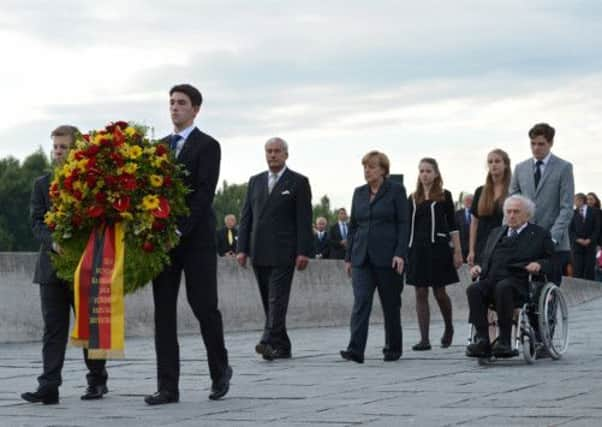Germany: Merkel accused of Dachau visit PR stunt


Opponents said her decision to become the first post-war leader to visit the site where 40,000 people were murdered was little more than an electioneering stunt. She is in the middle of a campaign seeking a third term in office, with polls next month, and is keen to build bridges with the immigrant community against the backdrop of a huge neo-Nazi trial.
Dachau, the first concentration camp of the Third Reich, is a vast sprawling site 12 miles from Munich that has been kept intact as a memorial to all who suffered and died there. Although not a site of mass murder – all the death camps proper were in Nazi-occupied Poland – it was a site of tremendous suffering where people died in hideous medical experiments or were beaten, worked or shot to death.
Advertisement
Hide AdAdvertisement
Hide AdMs Merkel agreed to visit the camp during this, the 80th year of the Nazi seizure of power in Germany. But she sandwiched the visit between election campaign meetings, rather than visiting on Holocaust Memorial Day in April, or the anniversary of the camp’s opening in March.
Renate Kuenast, the Green Party parliamentary leader, described the visit as “tasteless and impossible”, adding: “Whosoever is serious about commemorations in such a place of horror would guarantee that it was not done in the middle of an election campaign.”
The horrors of what people endured at Dachau are there for modern visitors to see: the whipping stools where prisoners were beaten to death; the crematoria where corpses were burned; the punishment cells and the torture instruments which the SS guards used on the 200,000 people who passed through its gates adorned with the phrase “Arbeit Macht Frei” (“work sets you free”).
Ms Merkel also met ten survivors of the camp at the parade ground.
While Ms Merkel and her Christian Social Union (CSU) allies in Bavaria defended the visit, historian Wolfgang Benz said: “There are other, less provincial, less shamefaced opportunities. It will make a casual impression when she lays down a wreath and expresses concern shortly before she goes into a marquee to the election campaign.”
He was referring to a beer tent set up in Dachau town centre, where she later met the party faithful.
Max Mannheimer, 93, a survivor of the Holocaust, was on hand to greet the chancellor at Dachau as police helicopters circled overhead and officers were deployed on the ground to keep protesters at bay. Ms Merkel was forced to abandon a visit to Ingolstadt, 100 miles away, on Monday after a man suffering from psychosis took hostages. They were freed after police stormed the building and shot him in the shoulders and legs.
CSU officials said Ms Merkel was invited last autumn to make the visit to Dachau and decided to go ahead with it in July. Aides insisted her visit to the camp – during which she laid a wreath to victims, including four female British agents of the SOE service – was itself “non-political”.
Advertisement
Hide AdAdvertisement
Hide AdBut it is a fact that Ms Merkel is acutely aware of an alienation among immigrants eligible to vote, mostly due to government inaction to stop members of the National Socialist Underground cell from assassinating Turkish businessmen during a decade-long killing spree. The trial of the last survivor of the cell, Beate Zschaepe, and her accomplices continues in Munich.
However, the chancellor also found allies for her Dachau visit. The chairman of the Jewish community of Munich and Upper Bavaria, Charlotte Knobloch, said: “It is commendable that the chancellor takes the opportunity during her visit to the region to visit the memorial site of the former concentration camp. This is a … touching signal.”
Ms Merkel’s visit lasted about an hour – about 90 minutes less than the museum keepers recommend as necessary to fully tour the massive complex.
And the Mittelbayerische newspaper’s website said Ms Merkel planned to travel to the beer tent just 15 minutes after finishing her tour of the camp, saying: “First sorrow and dismay – then beer and pretzels.”